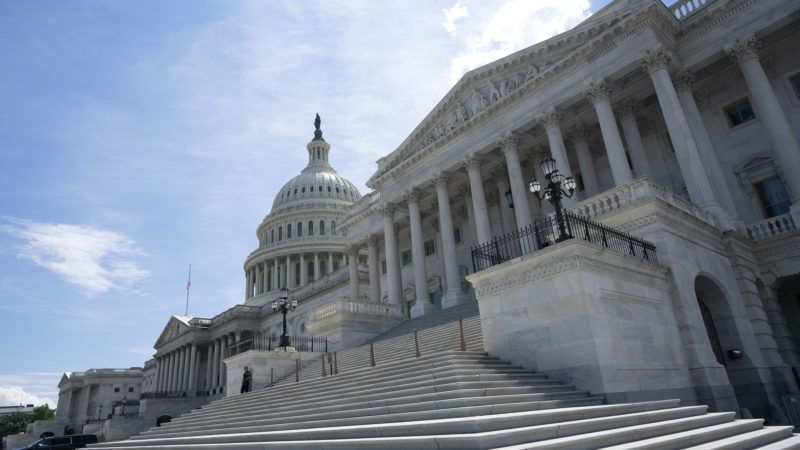The Next Coronavirus Stimulus Plan: More Spending, Smaller Unemployment Benefits, and Tax Breaks for Going Out To Eat
Senate Republicans announced Monday that the federal government will pay an additional $200 per week in unemployment benefits. The $600 per week benefits boost will expire on July 31.

Just days before boosted unemployment benefits for millions of American workers who have lost jobs due to the coronavirus pandemic are set to expire, Senate Republicans have unveiled a new stimulus package that would prevent those payments from vanishing entirely.
The proposal outlined on Monday afternoon by Senate Majority Leader Mitch McConnell (R–Ky.) would give unemployed workers an additional $200 per week on top of whatever benefits they receive through state-level unemployment insurance programs. That's one-third of the current $600 unemployment benefits boost that the federal government has been paying since the passage of the Coronavirus Aid, Recovery, and Economic Security Act (CARES Act) in late March.
"The American people need more help," McConnell said on the Senate floor as he announced the Health, Economic Assistance, Liability Protection and Schools (HEALS) Act.
The continued-but-reduced payments are on one hand an acknowledgment of the depth of the economic recession triggered by COVID-19 and associated lockdowns—more than 30 million Americans have filed for unemployment benefits since the start of the pandemic. On the other, they reflect a growing concern among Republicans about the status of the country's finances after more than $3.6 trillion in emergency spending in recent months, as well as concern that the $600 per week payments might hamper the post-coronavirus recovery.
Though unemployment benefits vary from state to state, the federal "bonus" meant the average worker could qualify for as much as $900 per week—well over $20 an hour, if you assume a standard 40-hour workweek. Last month, the Congressional Budget Office estimated that nearly five out of every six beneficiaries would be earning more money by not working if the $600 unemployment benefits boost was extended through the end of the year.
Senate Democrats have proposed keeping the boosted benefits in place through March 2021 of the economy does not improve, and Senate Minority Leader Chuck Schumer (D–N.Y.) trashed the Republican plan in remarks delivered on the Senate floor shortly after McConnell announced the bill.
Some Republicans may also oppose the effort. Sen. Rand Paul (R–Ky.) stormed out of a Senate GOP luncheon last week and slammed his colleagues for proposing more deficit spending. The Club For Growth, a conservative grassroots organization that agreed to look the other way when Congress voted on the deficit-hiking CARES Act in March, called on lawmakers to reject the new stimulus plan. David McIntosh, the organization's president, said in a statement that "the legislation irresponsibly spends on an amended extension of the expanded unemployment insurance benefit and another round of stimulus checks" and criticized McConnell for not including language that would expand educational choice for parents of students in public schools that may not reopen in the fall.
The HEALS Act, if passed, would be the fourth major stimulus package intended to address the COVID-19 pandemic, and it is in many ways a direct sequel to the CARES Act.
Like the CARES Act did in April, the HEALS Act calls for sending $1,200 direct payments to American households, and it would provide another infusion of federal cash to provide loans to small businesses that keep employees on payroll during the crisis. As was the case previously, those $1,200 checks will be phased out for individuals who earned higher levels of income last year. CNBC reported that the phase-outs will start around $75,000 and up. The payments will include an additional $500 per dependent.
When it comes to the small business loans, Sen. Susan Collins (R–Maine) said Monday they would be targeted specifically toward businesses with fewer than 300 employees—a narrower focus that would address one of the major complaints about the Paycheck Protection Program (PPP) established by the CARES Act.
McConnell said the bill would also include legal liability protection for businesses and hospitals to protect them from lawsuits if customers or patients contract the coronavirus—unless the business is guilty of "gross misconduct" or "willful ignorance." And Sen. Tim Scott (R–S.C.) told HuffPost that the bill will include an amped-up tax break intended to encourage Americans to eat out at restaurants.
Tim Scott says he included the 100% business meal deduction in the GOP bill, up from 50%.
He says that with "limited indoor dining, we can keep folks safe…it will lead to more orders, translate to more take home pay…and more revenues for millions of small businesses."
— Igor Bobic (@igorbobic) July 27, 2020
The bill also includes $105 billion to help schools safely reopen, but it is unclear whether the payments will be made available only to schools that decide to reopen fully—something the president has suggested.
There is no official price tag for the HEALS Act yet—but, as Reason's Elizabeth Nolan Brown reported yesterday morning, the best estimates are coming in at around $1 trillion.
